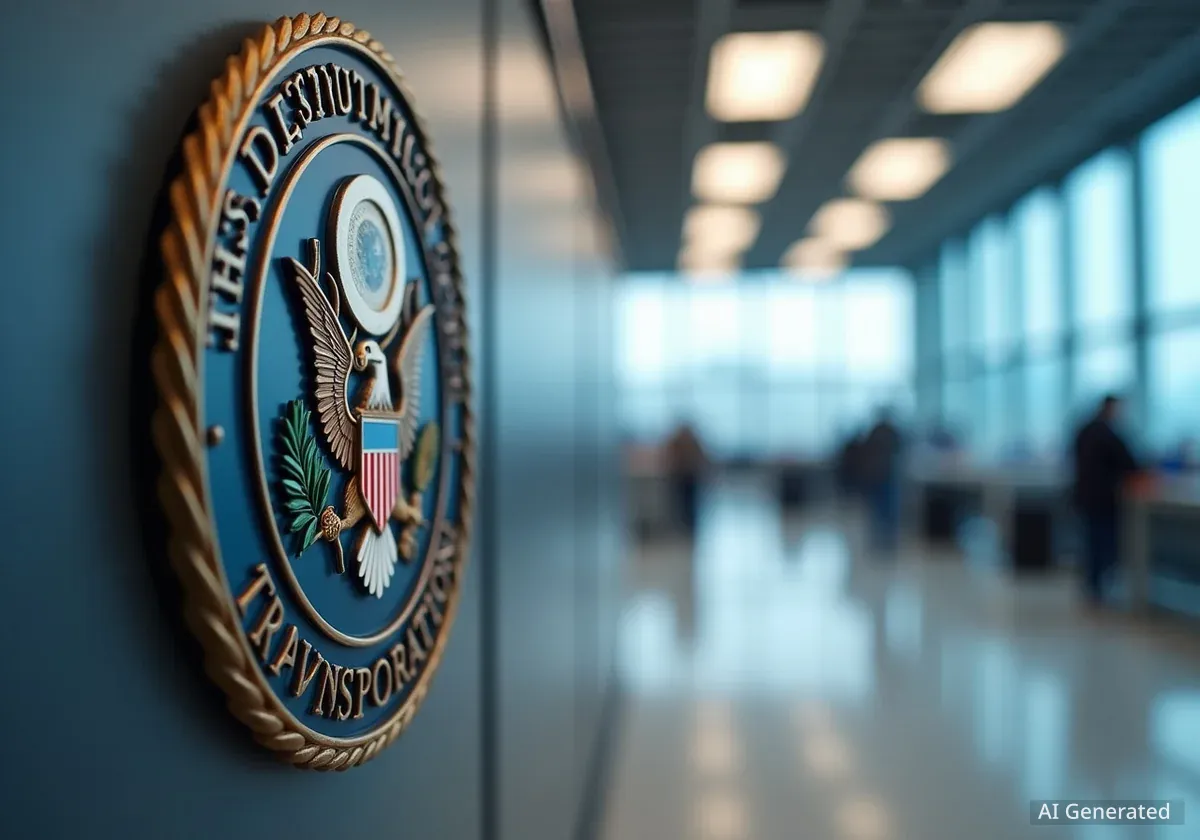The U.S. Department of Transportation (DOT) is considering reducing or eliminating several airline passenger protection rules. These rules were established or proposed under the Biden administration and earlier periods. This move aligns with the airline industry's desire for fewer regulations, a stance that has drawn criticism from consumer advocacy groups.
Last week, the DOT announced it had withdrawn a proposed rule. This rule would have required airlines to pay passengers between $250 and $750 for significant delays or cancellations. This compensation would apply when issues were under the airline's control, such as mechanical problems, crew shortages, or system failures. The rule also aimed to mandate free meals, lodging, and rebooking for affected travelers.
Key Takeaways
- DOT is reviewing or repealing several airline passenger protection rules.
- A proposed rule for mandatory compensation for delays/cancellations has been withdrawn.
- Airlines argue for less regulation, citing competition as a passenger benefit.
- Consumer advocates contend the U.S. airline market is an oligopoly, not truly competitive.
- U.S. passenger rights lag behind those in Canada, the UK, and the EU.
DOT's Regulatory Review and Industry Influence
The process of rolling back passenger protections began in April. At that time, the DOT asked for public comments to help identify regulations that could be changed or removed. This request was part of implementing presidential executive orders, including Executive Order 14219, which aims for government efficiency and deregulation.
The DOT received nearly 1,000 comments. Among these was a 93-page document from Airlines for America (A4A). A4A is a trade group representing major U.S. airlines. Their document included a list of regulations they wished to see eliminated.
Airlines for America claimed that the Biden administration's "activist agenda" hindered innovation and led to higher ticket prices. The airlines maintain that competition, rather than regulation, would better serve passengers.
"The airlines are not just asking for minor tweaks," travel expert Christopher Elliott warned in a recent column. "If they get their way, flying could become a one-sided game where airlines hold all the cards."
Elliott further explained that the primary goal of airlines is to generate profit, not necessarily to ensure passenger happiness. He stated that removing more rules helps them achieve this financial goal. He suggested that without intervention, passenger rights could diminish significantly.
Airline Market Structure
Consumer advocates argue that the U.S. aviation industry operates as an oligopoly. This means only four major airlines control approximately 80 percent of domestic flights. This market structure limits true free-market competition.
Consumer Advocacy Concerns
Consumer advocates disagree with the airlines' position. They argue that the U.S. aviation industry is not governed by free-market competition. Instead, they say it is an oligopoly, with a few airlines dominating the market.
William McGee, a senior fellow for aviation at the American Economic Liberties Project, spoke on this issue. This nonprofit organization works against monopolistic practices. McGee stated, "Americans may disagree on the proper role of government, but no one voted for canceled refunds, hidden fees, and zero accountability."
McGee also wrote in a blog post that this agenda makes government serve lobbyists, not the public. He believes the DOT's plan to change or repeal consumer protection rules signals to airlines that they can deny refunds, hide fees, and leave passengers stranded without consequences. This is happening, he noted, at a time when most Americans are already unhappy with the current state of air travel.
International Comparison
Even if current Biden administration rules remain, the U.S. still lags behind many other countries in passenger rights. Canada, the United Kingdom, and the European Union have significantly more passenger-friendly laws. The U.S. does not even have a comprehensive "Passenger Bill of Rights," a law first proposed in 2007.
The Gap in Passenger Rights
The United States' approach to passenger rights differs greatly from other developed nations. For example, in the European Union, passengers on a flight arriving more than three hours late due to the airline's fault can claim up to 650 euros in compensation. No such automatic compensation exists in the U.S.
McGee highlighted this disparity in a recent article for Frommer's. He wrote, "In America, we largely let airlines police their own passenger protections, and we all know how well that has worked – or rather has not worked, in meltdown after meltdown after meltdown that left people stranded and paying out of pocket."
Interestingly, U.S. carriers flying to Europe often provide better treatment to passengers during problems. This is due to strong customer service regulations in those countries. These rules apply to all flights landing in or departing from Europe, including connecting flights.
U.S. airlines claim that if they were required to offer the same rights as their European counterparts, they would have to increase ticket prices. However, Christopher Elliott disputes this. He pointed out that Europe's airline market remains highly competitive, with budget carriers succeeding under the existing compensation system.
Cost of Enhanced Protections
According to a report from AirHelp, a company that helps passengers file compensation claims, U.S. airlines could provide compensation similar to European standards for less than $1 per passenger. A recent AirHelp survey showed that 26 percent of Americans would pay an extra $10 to $20 for tickets if it guaranteed compensation for cancellations or long delays.
Transparency in Pricing and Performance Data
Consumer advocates, including the nonprofit Checkbook, support transparent pricing for all purchases. Airlines, however, often prefer opaque pricing. This means they show basic ticket prices upfront but display extra costs, such as checked luggage or seat selection, later in the booking process. This practice makes it difficult for consumers to compare the true cost of flights across different airlines.
A DOT rule issued during the Biden administration aimed to address this. It required "ancillary" fees—extra costs for baggage, cancellations, or changes—to be shown alongside ticket prices. The rule did not cap these fees but mandated upfront disclosure. The DOT estimated this rule would save airline passengers $500 million annually.
The airline industry challenged this rule in court, claiming that "all-in pricing" would cost millions for website updates. An appeals court has temporarily blocked the disclosure rule. Airlines for America now wants the DOT to repeal it completely, arguing the department lacked the authority to issue it.
Threat to Performance Statistics
Airlines also seek to limit the performance statistics that the DOT gathers and publishes monthly. The department's Air Travel Consumer Report currently tracks key metrics. These include flight delays, cancellations, consumer complaints, mishandled baggage, involuntary denied boardings (bumping), and animal incidents.
This data is the only public measure of industry performance. It helps travelers make informed choices when selecting an airline. It also encourages carriers to improve their customer service. Without the Air Travel Consumer Report, passengers would not know crucial details.
For example, the latest DOT report showed American Airlines flights arrived on time only 65.8 percent of the time in June. In contrast, Alaska Airlines (72.6 percent), Southwest Airlines (71.1 percent), and United Airlines (71.1 percent) performed significantly better.
"Without accurate data, there’s no way for passengers or the DOT to hold the airlines accountable," said John Breyault, a vice president at the National Consumers League and a former member of DOT’s Aviation Consumer Protection Advisory Committee. "If DOT does what the industry wants, they’d be adopting a ‘trust, but don’t verify’ approach to the airlines. This is unacceptable for passengers, and it should be unacceptable to Congress, too."
Future Outlook for Passenger Protections
The Department of Transportation is expected to follow the president’s directive. This means many consumer protection rules enacted by the Biden administration are likely to be eliminated or weakened. The DOT’s Automatic Refund Rule, however, is more resilient to change. This is because it resulted from a law passed by Congress. Even so, the DOT has indicated it plans to review this rule as well.
This rule specifies what airlines must do when a flight is canceled or "significantly changed" for any reason, and the passenger does not wish to be rebooked. The airline must automatically refund the full fare, including any extra fees like baggage costs, unless the passenger chooses another form of compensation, such as points or travel vouchers.
"Significant changes" to a flight include several scenarios:
- Departure or arrival times differing by more than three hours domestically or six hours internationally.
- Departures or arrivals from a different airport.
- Increases in the number of connections.
- Instances where passengers are moved to a lower class of service.
- Connections at different airports or flights on different planes that are less accessible or accommodating for a person with a disability.
Will passengers demand better treatment? Will airlines respond to customer dissatisfaction?
Pete Buttigieg, the Biden administration's transportation secretary, told CNN, "They will not do anything to protect passengers unless Congress makes them."
Checkbook.org is a nonprofit organization that assists consumers in finding good service and fair prices. It offers unbiased ratings, advice, and price information. Checkbook relies on consumer support and does not accept money from service providers it evaluates. Herb, a consumer advocate, can be reached via his website, Consumerman.com.





